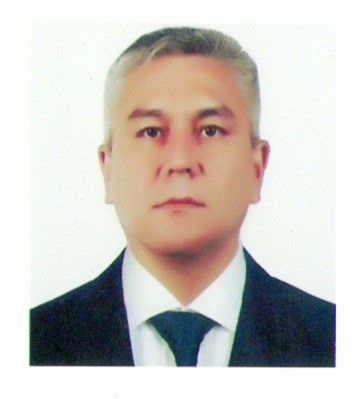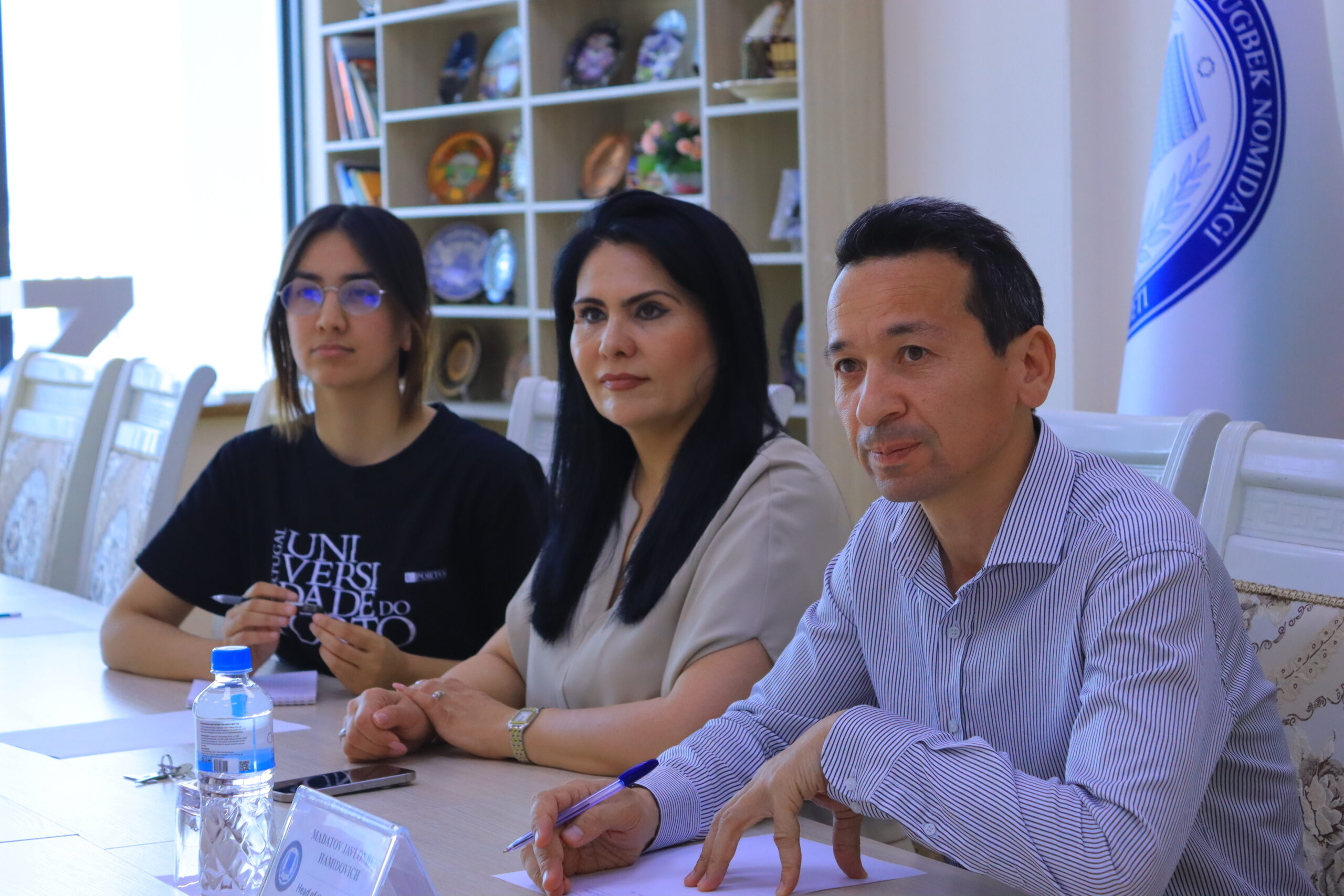
Shamsiyev Oktam – Head of department
100174, Universitet street 4, Olmazor district, Tashkent
Monday-Friday, 14:00 – 17:00
+998 97 731-96-69
e-mail: uktamshams75@mail.ru
1. The disciplines taught at the department are in a separate form for bachelors and masters
| № | Science name | Brief information about science |
| 1. | Social psychology | To inculcate knowledge, categories and concepts related to social psychology to students. Lectures and practical exercises on the origin of science, different theories, methods, individuals, groups, communities, behavior and their functions and types. |
| 2. | Basics of psychological training. | The need for systematic social psychological training, to explain to students the basic theoretical approaches and concepts, as well as the universal (general) principles of psychological counseling, its techniques and considerations. |
| 3. | Individual and group counseling training. | The individual and group counseling course focuses on the theoretical and practical study of the training sessions. It involves training and analysis of different types of training exercises. |
| 4. | Social psychology | To inculcate knowledge, categories and concepts related to social psychology to students. Lectures and practical exercises on the origin of science, different theories, methods, individuals, groups, communities, behavior and their functions and types. |
| 5. | Self-management practicum. | The science of self-governance is not only about educating students, but also preparing them to work effectively in a variety of fields. |
| 6. | Parental Psychology | The science of parental psychology is a psychological observation of its goals, the conditions for mastering the role of parents and the systematization of its content in order to form its competence. |
| 7. | Family System Research Systems. | Systematize the formation of the concept of a systematic approach to the study of the family and the formation of ideas about the methods of studying the family, the family psychologist to work in the family in the field of prevention, counseling and correction and the concept of methods of studying the family. |
| 8. | Clinical psychology. | To help to gain a deep, comprehensive and solid knowledge of the basic concepts and mechanisms, phenomena, categories and methods of the discipline “Clinical Psychology”, the composition of medical psychological knowledge and its role in the system of clinical subjects. |
| 9. | Family counseling practicum. | The need to base the science of family counseling on modern approaches to the practice of family counseling is to equip psychologists with theoretical and practical knowledge about the specificity of ontogenetic development in human mental development, the specificity of psychotherapeutic approach in theoretical and practical training |
| 10. | Destructive behavior psychology. | The subject of “Psychology of Destructive Behavior” reflects the content of the direction of interdisciplinary research under the name “Deviant Behavioral Psychology”. In order to overcome stereotypes and superstitions in the understanding of students by the diversity of deviant behavior, the scope of information on this problem is considered in the subject “Psychology of Destructive Behavior.” This concept reflects the ideas of humanistic psychology, the basic idea of which is to search for the psychological causes of similar behavior and look at it in terms of personality perfection, originality, constructiveness. |
| 11. | Psychology of crisis situations. | Interrelation of the concepts of “environment” and “situation”. Approaches to understanding difficult life situations. Objective and subjective features of difficult life situations. Behavior of a person in difficult life situations. Methods of psychological protection. Dealing with behavior. Personal adaptation to the situation. Adaptation as an adaptation strategy. Optimal and extreme living conditions. Emergence of extreme conditions in professional activity and daily life, communication. Cognitive, role, existential, and other types of contradictions determine the extreme severity of living and working conditions. |
| 12. | Projective methods in psychological activity. Methods of group work with young people. | The subject “Projective methods in the work of psychologists” expands the worldview of students on experimental psychological knowledge, aimed at forming the laws of the laws of experimental psychology and the functions of psychological processes, interpersonal skills in our society and their implementation in practice. |
| 13. | Gender psychology | The problem of gender research in psychology. Sources of development of gender problems in psychology. Gender psychology. Theoretical and methodological foundations of gender. |
| Communication and interpersonal conflicts. | Scientific and analytical study of the place and role of conflicts in the system of society and interpersonal relations, their objective assessment, theoretical and conceptual aspects of the possibility of their management, prevention or elimination based on the nature of conflicts; the need to study the laws of psychology in enriching and developing their worldview. | |
| 14. | Occupational Psychology. | To provide a source of theoretical and practical information on psychological concepts in the field of science, the concept of professions, the formation of a reserve of ideas, as well as career choice and career guidance. |
| 15. | On the maturity of the person | “Personal development training” is the training of specialists in the field of training activities. Personality maturity is one of the sciences that analyzes its positive change and trains professionals. |
| 16. | Social psychology | To inculcate knowledge, categories and concepts related to social psychology to students. Lectures and practical exercises on the origin of science, different theories, methods, individuals, groups, communities, behavior and their functions and types. |
| 17 | Medical Psychology. | It is characterized by the need to study the main forms of medical psychology and the methodological features of the formation of an integrated approach to it, the genetic and physiological significance of human ontogenetic development, norms and pathology of mental development, abnormal development and its prevention, psychotherapeutic methods. |
| 18. | Psychology of labor and engineering. | Labor and engineering psychology is a branch of psychology that studies the specificity of various labor activities, the socio-history and specific production conditions, the tools of labor, the methods of labor education, and the psychological characteristics of the worker-individual. |
| 19. | Psychology of destructive behavior. | The subject of “Psychology of Destructive Behavior” reflects the content of the direction of interdisciplinary research under the name “Deviant Behavioral Psychology”. In order to overcome stereotypes and superstitions in the understanding of students by the diversity of deviant behavior, the scope of information on this problem is considered in the subject “Psychology of Destructive Behavior.” |
| 20. | Management and marketing psychology. | To inculcate in students knowledge, categories and concepts related to management and marketing psychology. Lectures and practical exercises on the origin of science, various theories, methods, personality, group, community, behavior and their functions, types. |
| 21 | Special psychology. | To develop students’ knowledge of special psychology, skills and competencies in the study and analysis of human psychology with various disabilities. |
1. About researchers and scientific works
| № | The research professor’s F.I.Sh. | Academic degree, title | The topic of the dissertation |
| 1 | Ziyavitdinova Gulnora Ziyautdinovna | head teacher | Socio-psychological features of preparation for family life |
| 2 | Kamalova Zulfiya Khasanovna | teacher | Socio-psychological conditions for the development of professional reflection in the future educator |
1. The structure of the department
| № | F/I/Sh | |
| 1 | Shamsiev Uktam Bakhriddinovich | uktamshams75@mail.ru |
| 2 | Majidov Nabi Mahmudovich | Majidov55@mail.ru |
| 3 | Ilxamova Dilfuza Ilyasovna | 2006@mail.ru |
| 4 | Abdurahmanova Zuhra Erkinovna | zukhra_psy@mail.ru |
| 5 | Dalimova Nilufar Meliboevna | n.dalimova@mail.ru |
| 6 | Qudratullaeva Ruxsora Bakhtiyarovna | ruhsora-83@list.ru |
| 7 | Gazieva Zuxra Ergashevna | zukhra_psy@mail.ru |
| 8 | Raximova Indira Igorevna | indira.rahimova.1987@mail.ru |
| 9 | Ziyavitdinova Gulnora Ziyautdinovna | gziyavitdinova@mail.ru |
| 10 | Nigmatulina Liliya Alievna | lila_djuraeva@mail.ru |
| 11 | Kamalova Zulfiya Khasanovna | zulfaz.2515@gmail.com |
| 12 | Jabbarova Lyutsiya Alievna | Luciajabarova85@gmail.com |
| 13 | Yusuvalieva Adiba Yadgarovna | adiba2013@mail.ru |
| 14 | Karimova Mohigul Tolkinjon qizi | mohigulkarimova2@gmail.com |
| 15 | Valieva Dilafruzhon Gayrat qizi | abdulazizkudratullayev@gmail.com |


